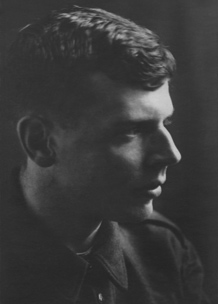
Ivor Gurney, Christmas 1917 (photographed by Sydney Pitcher)
Celebrating Gurney in Gloucester
World War One poet and composer Ivor Gurney (1890-1937) is one of Gloucestershire’s most famous sons. His works are now becoming available to the public following three years of extensive archiving.
From a mud splattered music manuscript written in the trenches, to his last poem, composed during his final incarceration in a mental hospital, Gurney’s works have been mapped in a detailed and extensive online catalogue, the first part of which goes live this week.
Philip Lancaster, a PhD student at the University of Exeter, has been working at Gloucestershire Archives for the past three years to reorganise Gurney’s papers. Philip said, “This extraordinary collection is yielding many fresh insights into the life and work of Gurney, and his place amongst his contemporaries. It shows the true extent and quality of his work, and his growth as both musician and poet, giving strength to a recent resurgence of interest in this remarkable figure.” In conjunction with Professor Tim Kendall, who heads the Centre for South West Writing at the University of Exeter, Philip is producing a three-volume edition of Gurney’s poems for Oxford University Press.
Philip has also helped to edit and prepare the scores for Gurney’s ‘A Gloucestershire Rhapsody’. This landmark orchestral piece celebrates the Gloucestershire landscape which Gurney knew intimately and loved above all other places. It was composed between 1919 and 1921, and although Gurney endeavoured to get the work performed, it has had to wait nearly 90 years to be realised. The world premiere of ‘A Gloucestershire Rhapsody’ is being given in Cheltenham by the Philharmonia Orchestra on Thursday 12 August, as part of the Gloucester Three Choirs Festival. The occasion is particularly appropriate because Gurney himself performed at the festival over a century ago, when he was a boy chorister at Gloucester Cathedral.
As well as hosting a rare performance of a string quartet and some unpublished songs, the festival includes an opportunity to hear Gurney’s ‘The Trumpet’, which will be performed in an orchestral version created and published by Philip Lancaster.
Alongside this major celebration of one of the South West’s most important 20th-century writers and musicians, a landmark sculpture is being installed in Gloucester docks where Gurney briefly held the position of organist at the Mariners’ chapel. The new sculpture The Candle, designed by Wolfgang Buttress, is in the form of a beacon with smoke-like spirals cut into it. Around the base of the sculpture are inscribed two of Gurney’s poems, both titled ‘Requiem’. The poems date from November 1916, when Gurney was serving in the trenches. The first poem begins, ‘Pour out your light, O stars, and do not hold/Your loveliest shining from earth’s outworn shell.’
Date: 11 August 2010
